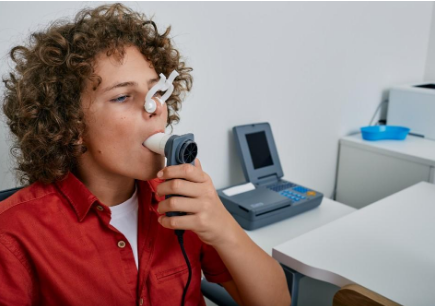
Top Spirometry Testing Clinic In Seawoods
Spirometry Testing is a common diagnostic procedure used to measure how well your lungs are functioning. It involves the use of a spirometer, a device that records the amount of air you can inhale and exhale, and how quickly you can exhale the air. This test helps diagnose and monitor lung conditions, such as asthma, chronic obstructive pulmonary disease (COPD), and other respiratory diseases.
The Spirometry Test Procedure
1. Preparation: The patient is instructed to avoid smoking or heavy meals before the test. Also, any inhaled medications should be discussed with the doctor.
2. The Test: The patient will be asked to take a deep breath and then blow out as hard and fast as possible into a spirometer, a machine that measures the amount of air exhaled and how quickly the air is expelled.
3. Results: The results from the spirometry test can reveal whether the lungs are functioning properly or if there are signs of any restrictive or obstructive lung diseases. It can also help track the progression of a disease over time.
Conditions Diagnosed Using Spirometry
Spirometry testing is commonly used to diagnose a variety of respiratory conditions. Some of the conditions that can be identified through spirometry testing include:
1. Asthma: A chronic condition that causes inflammation and narrowing of the airways. Spirometry can help determine the severity of asthma and monitor treatment effectiveness.
2. Chronic Obstructive Pulmonary Disease (COPD): A group of lung diseases, including emphysema and chronic bronchitis, that cause obstructed airflow. Spirometry is critical in diagnosing and managing COPD.
3. Pulmonary Fibrosis: A condition where lung tissue becomes scarred and thickened, leading to difficulty breathing. Spirometry can help assess the severity of the condition.
4. Restrictive Lung Diseases: These include conditions where the lungs cannot expand fully, reducing the total lung volume. Spirometry helps diagnose and monitor restrictive lung diseases.
5. Cystic Fibrosis: A genetic disorder that causes severe lung damage. Spirometry is used to track lung function in individuals with cystic fibrosis.
Other Services Offered by Dr. Tanay Sinha’s Clinic
Apart from spirometry testing, Dr. Tanay Sinha’s clinic provides a wide range of diagnostic and therapeutic services for lung-related health issues:
• Chest X-Rays and CT Scans: To identify structural abnormalities in the lungs.
• Bronchoscopy: A procedure to examine the airways and collect samples for testing.
• Allergy Testing: To identify allergens that may be contributing to respiratory issues.
• Asthma and COPD Management: Tailored treatment plans to help manage chronic conditions.
• Pulmonary Rehabilitation: For patients recovering from severe respiratory conditions or surgeries.
Advanced Tools
1. Digital Spirometers
Modern spirometers are compact, portable, and equipped with digital capabilities, allowing for real-time analysis and detailed reporting.
• High-resolution sensors for accurate measurement of airflow and volume.
• Touchscreen interfaces for ease of use.
• Integrated software to store, analyze, and compare patient data over time.
2. Wireless Spirometry Systems
Wireless spirometry systems offer convenience and flexibility, particularly for clinics and home-based testing.
• Bluetooth-enabled devices for seamless connectivity.
• Compatibility with mobile apps for remote monitoring.
3. Integrated Bronchodilator Testing
Advanced spirometry tools allow for integrated pre- and post-bronchodilator testing. This is essential for diagnosing and monitoring conditions like asthma and COPD.
• Automated comparison of results before and after bronchodilator use.
• Precision in detecting reversible airway obstruction.
4. Pediatric Spirometry Tools
Specialized spirometers are designed to cater to pediatric patients, ensuring accurate readings even in children.
• Smaller mouthpieces for comfort.
• Child-friendly designs and animations to encourage cooperation.
5. Advanced Reporting Software
Modern spirometry systems come with sophisticated software that generates detailed and easy-to-interpret reports.
• Graphical representation of lung function.
• Automated alerts for abnormal findings.
• Long-term trend analysis for chronic conditions.
• Helps pulmonologists make informed decisions.
• Enhances patient education and understanding of their condition.
6. Real-Time Feedback Systems
Some spirometry devices are equipped with real-time feedback mechanisms that guide patients during the test, ensuring optimal effort and accurate results.
• Reduces errors caused by incorrect technique.
• Improves test reliability and repeatability.
7. Environmental Monitoring Capabilities
Certain advanced spirometry systems also assess environmental factors like temperature, humidity, and air quality, which can influence test results.
• Ensures standardized testing conditions.
• Provides insights into triggers for conditions like asthma or allergies.
8. Integration with Electronic Health Records (EHR)
Advanced spirometry tools are often integrated with EHR systems, ensuring seamless documentation and sharing of patient data.
• Enhances collaboration among healthcare providers.
• Streamlines follow-up care and monitoring.
Conclusion
Spirometry is a valuable tool in diagnosing and managing various respiratory conditions. If you’re in Seawoods, Navi Mumbai and are looking for a trusted pulmonologist to conduct spirometry testing, Top Spirometry Testing Clinic In Seawoods such as Dr. Tanay Sinha’s clinic is an excellent choice. With advanced equipment, expert care, and a patient-centred approach, you can be assured of receiving top-notch services to monitor and improve your lung function.
Regular spirometry testing can help catch respiratory problems early, especially in high-risk individuals, and provide the necessary treatments to improve quality of life. Don’t hesitate to consult Dr. Tanay Sinha if you have any concerns regarding your lung health.
